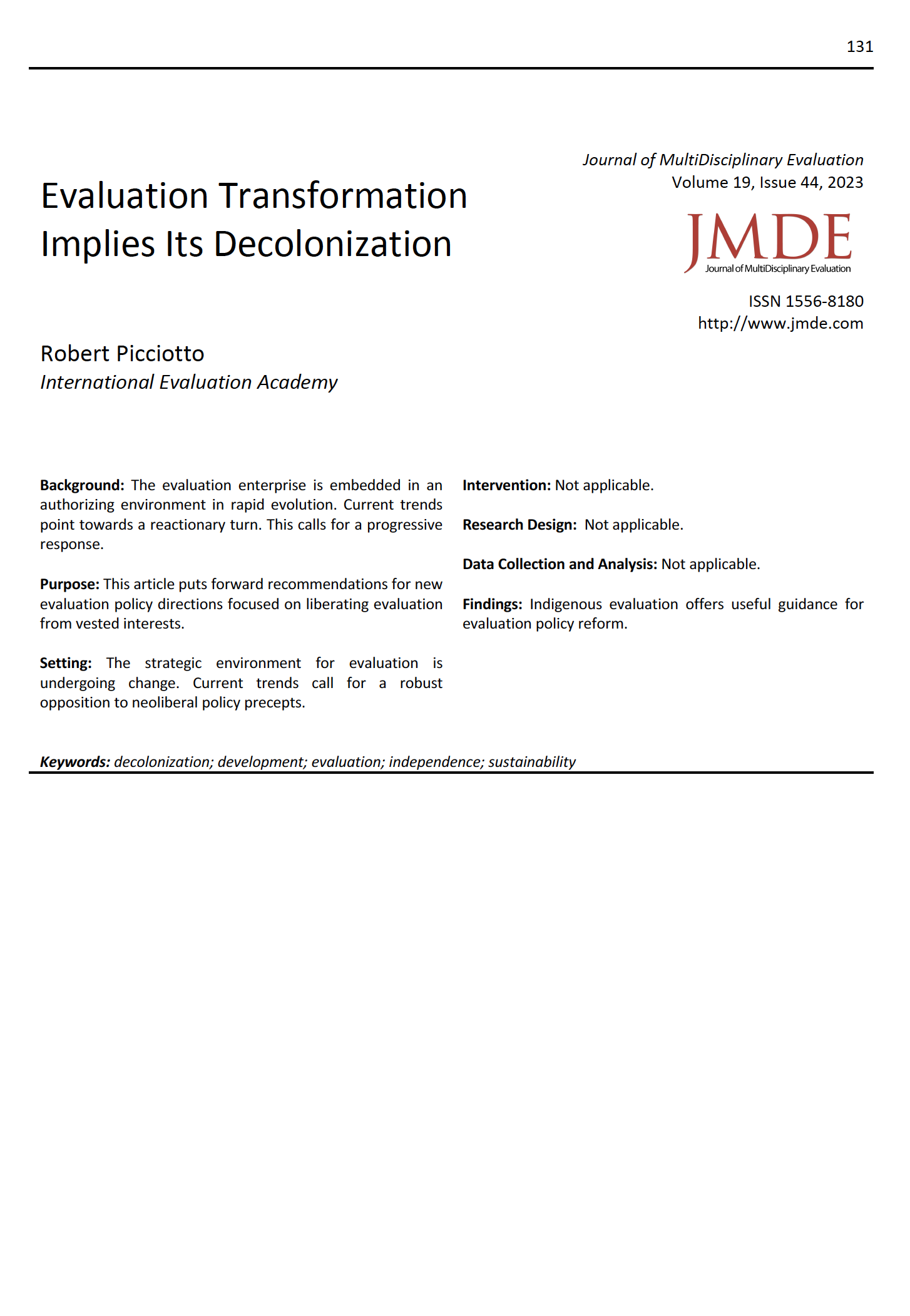Evaluation Transformation Implies Its Decolonization
Main Article Content
Abstract
Transformational evaluation implies a decolonization process focused on relieving the misery and suffering of the oppressed. To inform such a reorientation, this article describes the challenges of social transformation; probes the links between capitalism, slavery and racism; takes stock of the post-colonial development order; examines the legacy of the evaluation occupation; and recommends new policy directions inspired by indigenous evaluation.
Downloads
Article Details

This work is licensed under a Creative Commons Attribution-NonCommercial 4.0 International License.
Copyright and Permissions
Authors retain full copyright for articles published in JMDE. JMDE publishes under a Creative Commons Attribution-NonCommercial 4.0 International License (CC BY - NC 4.0). Users are allowed to copy, distribute, and transmit the work in any medium or format for noncommercial purposes, provided that the original authors and source are credited accurately and appropriately. Only the original authors may distribute the article for commercial or compensatory purposes. To view a copy of this license, visit creativecommons.org
References
Annan, K. A. (2009). Problems Without Passports. Special Report. Foreign Policy. November 9.
Baggini, J., (2017). A short history of truth: Consolations for a post-truth world. Quercus, Hachette.
Baldwin, R. (2016). The great convergence: Information technology and the new globalization. The Belknap Press of Harvard University Press.
Bruhn, M., & Gallego, F. (2012). Good, bad, and ugly colonial activities: Do they matter for economic development? The Review of Economics and Statistics, 94(2), 433–461.
Chancel, L., Piketty, T., Saez, E., & Zucmnan, G. (2022). World inequality report 2022. World Inequality Lab.
Chelimsky, E. (2006). The purposes of evaluation in a democratic society. In I. F. Shaw, J. C. Greene., & M. M. Mark (Eds.), The SAGE handbook of evaluation (pp.33-55). Sage Publications.
Dahler-Larsen, P. (2012). The evaluation society.
Stanford University Press.
Datta, L.-E. (1994). Paradigm wars: A basis for peaceful co-existence and beyond. New Directions for Program Evaluation, 61, 53–70.
Desmond, M. (2019, August 14). In order to understand the brutality of American capitalism you have to start on the plantation. New York Times Magazine.
FAO (2021). The State of Food Security and Nutrition in the World. Food and Agricultural Organization of the United Nations. Rome, Italy.
Forster, T., Kentikelenis, A. E., Reinsberg, B., Stubbs, T. H., & King, L. P. (2019). How structural adjustment programs affect inequality: A disaggregated analysis of IMF conditionality, 1980–2014. Social Science Research, 80, 83–113.
Foucault, M. (1980). Power/Knowledge: Selected Interviews and Other Writings 1972–1977. (C. Gordon, Ed.). The Harvester Press Ltd.
Fournier, D. (2005). Evaluation. In S. Mathison (Ed.), Encyclopedia of Evaluation (p. 140). Sage.
Ghate, R., Ghate, S., & Ostrom, E. (2011). Cultural norms, cooperation, and communication: Taking experiments to the field in indigenous communities. International Journal of the Commons, 7(2), 498–520. http://doi.org/10.18352/ijc.376
Hickel, J., Sullivan, D. & Zoomkawala, H. (2021). Plunder in the post-colonial era: Quantifying drain from the Global South through unequal exchange, 1960–2018. New Political Economy, 26(6), 1030–1047. https://doi.org/10.1080/13563467.2021.1899153
Hopson, R. K., Kirkhart, K. E., & Bledsoe, K. L. (2006). Decolonizing evaluation in a developing world: Implications and cautions for equity-focused evaluations. In M. Segone (Ed.), Evaluation for equitable results (pp. 59–85). UNICEF.
Kawakami, A. J., Aton, K., Cram, F., Lai, M. K., & Porima, L. (2007). Improving the practice of evaluation through Indigenous values and methods: Decolonizing evaluation practiceReturning the gaze from Hawai'i and Aotearoa. Hūlili: Multidisciplinary Research on Hawaiian Well-Being, 4(1), 319–348.
Lampedusa, G. T. D. (1963). The leopard. Fontana Books.
Mathison, S. (2018). Confronting capitalism: Evaluation that fosters social equity. In S. I. Donaldson & R. Picciotto, (Eds.), Evaluation for an equitable society (pp. 83-108) Information Age Publishing.
Mikulecky, D. C. (2001). The emergence of complexity: Science coming of age or science growing old? Computers and Chemistry, 25(4), 341–348.
National Oceanic and Atmospheric Administration. (2022, June 3). Carbon dioxide more than 50% higher than pre-industrial levels. https://www.noaa.gov/news-release/carbon-dioxide-now-more-than-50-higher-than-pre-industrial-levels
Ostrom, E. (1990). Governing the commons: The evolution of institutions for collective action. Cambridge University Press.
Oxfam. (2022). Inequality kills: The unparalleled action needed to combat unprecedented inequality in the wake of COVID-19. https://oxfamilibrary.openrepository.com/bitstream/handle/10546/621341/bp-inequality-kills-170122-summ-en.pdf
Patton, M. Q. (1988). Politics and evaluation. American Journal of Evaluation, 9(1), 89–94.
Picciotto, R. (2012), Experimentalism and development evaluation: Will the bubble burst? Evaluation, 18(2), 213–229.
Rehbein, B. (2020, September/December). Capitalism and inequality. Sociedade e Estado, 35(3).
Schwandt, T. A. (2018). Acting together in determining value: A professional ethical responsibility of evaluators. Evaluation, 24(3), 306–317. https://doi.org/10.1177/1356389018781362
Scriven, M. (1991). Evaluation thesaurus. Sage Publications.
Smith, D. M. (2019). Counting the Dead: Estimating the Loss of Life in the Indigenous Holocaust, 1492-Present. Southeastern Oklahoma State University. https://www.se.edu. 2019/09
Stern, N. (2007). The economics of climate change: The Stern review. Cambridge University Press.
van den Berg, R. D., Magro, C., & Adrien, M. H. (Eds.). (2021). Transformational evaluation for the global crises of our times. International Development Evaluation Association (IDEAS).
Vedung, E. (2010). Four waves of evaluation diffusion. Evaluation, 16(3), 263–277.
Veracini. L. (2010). Settler colonialism: A theoretical overview. Palgrave, Macmillan.
Williams, E. E. (1994). Capitalism & slavery. University of North Carolina Press.

